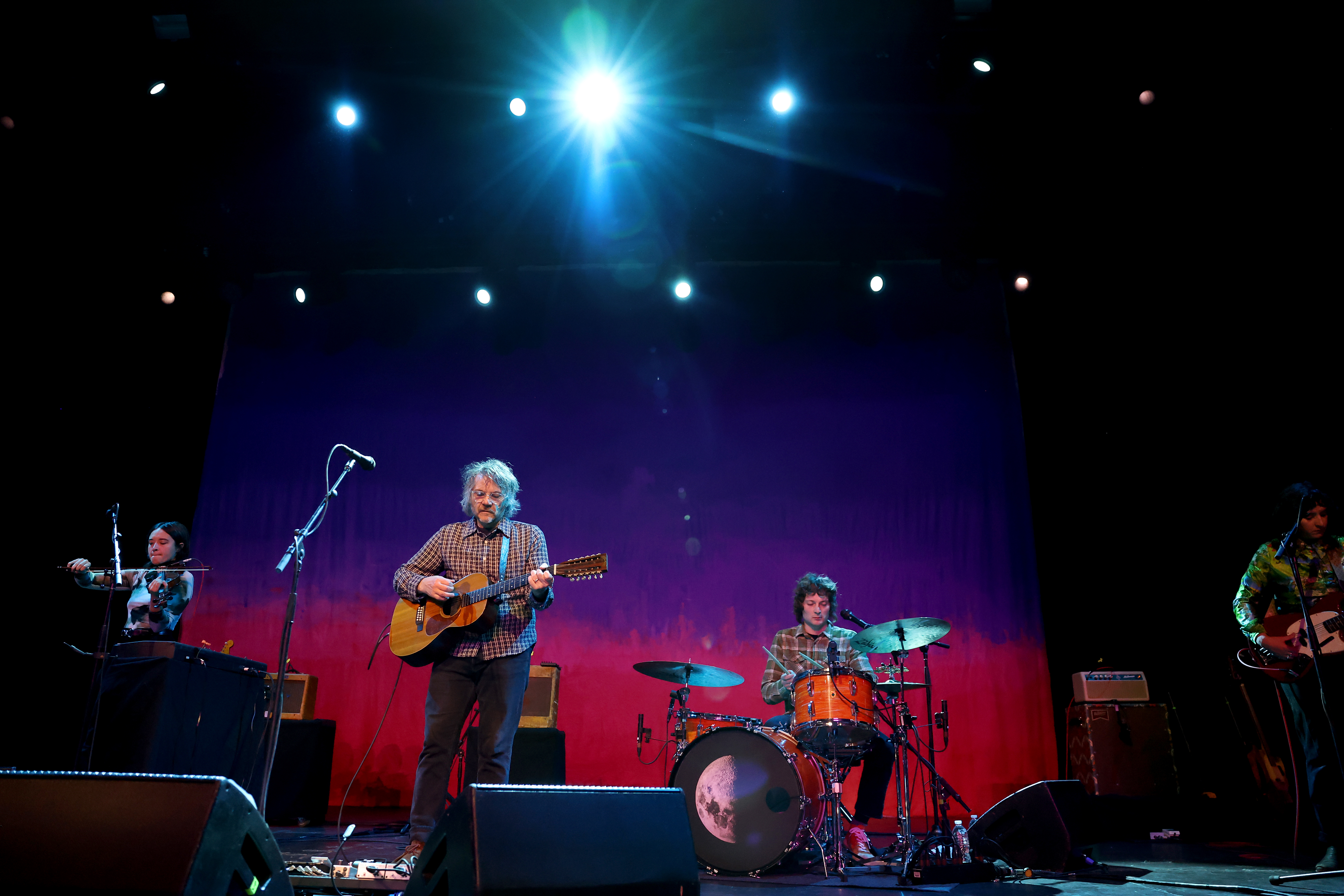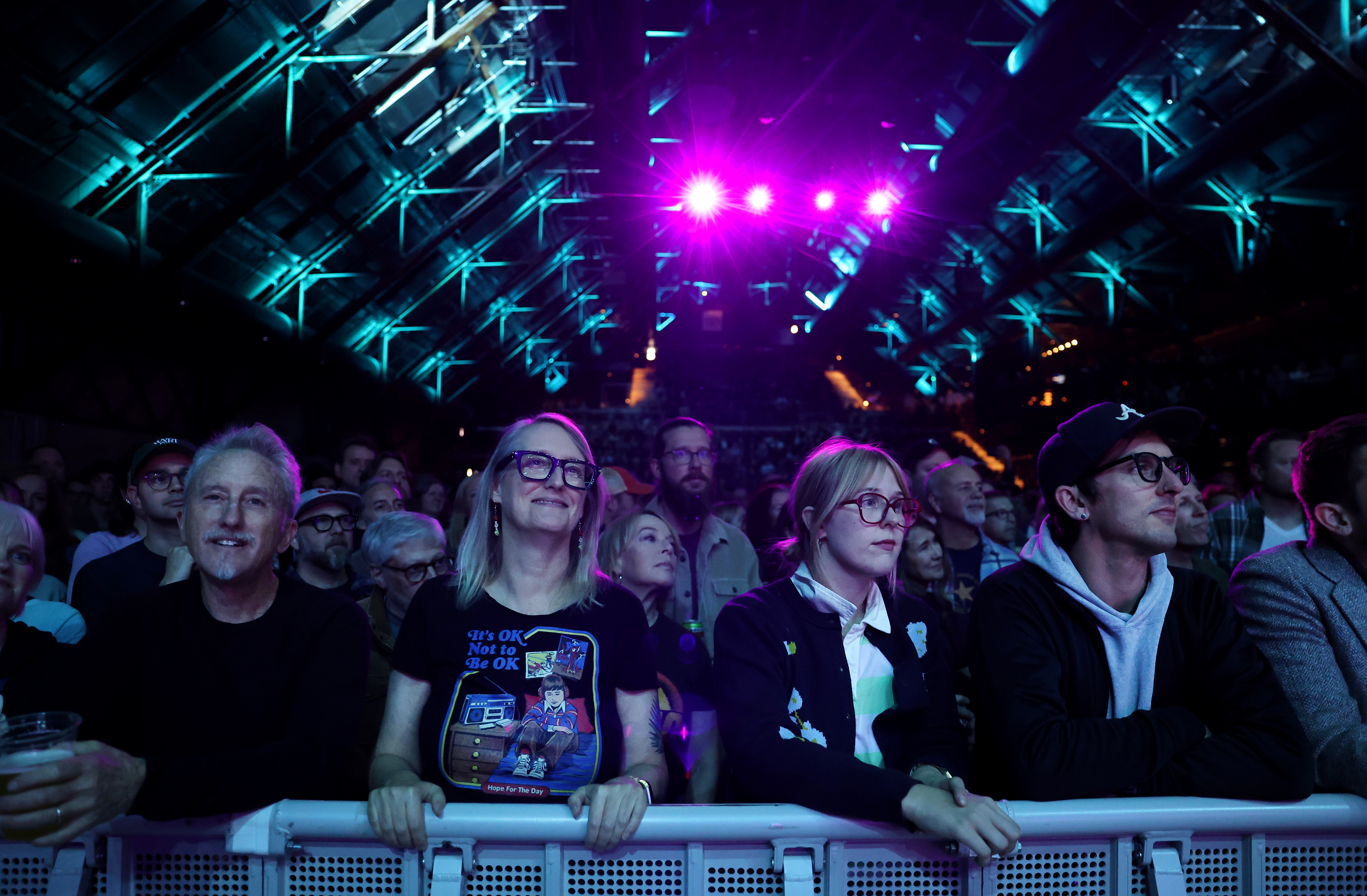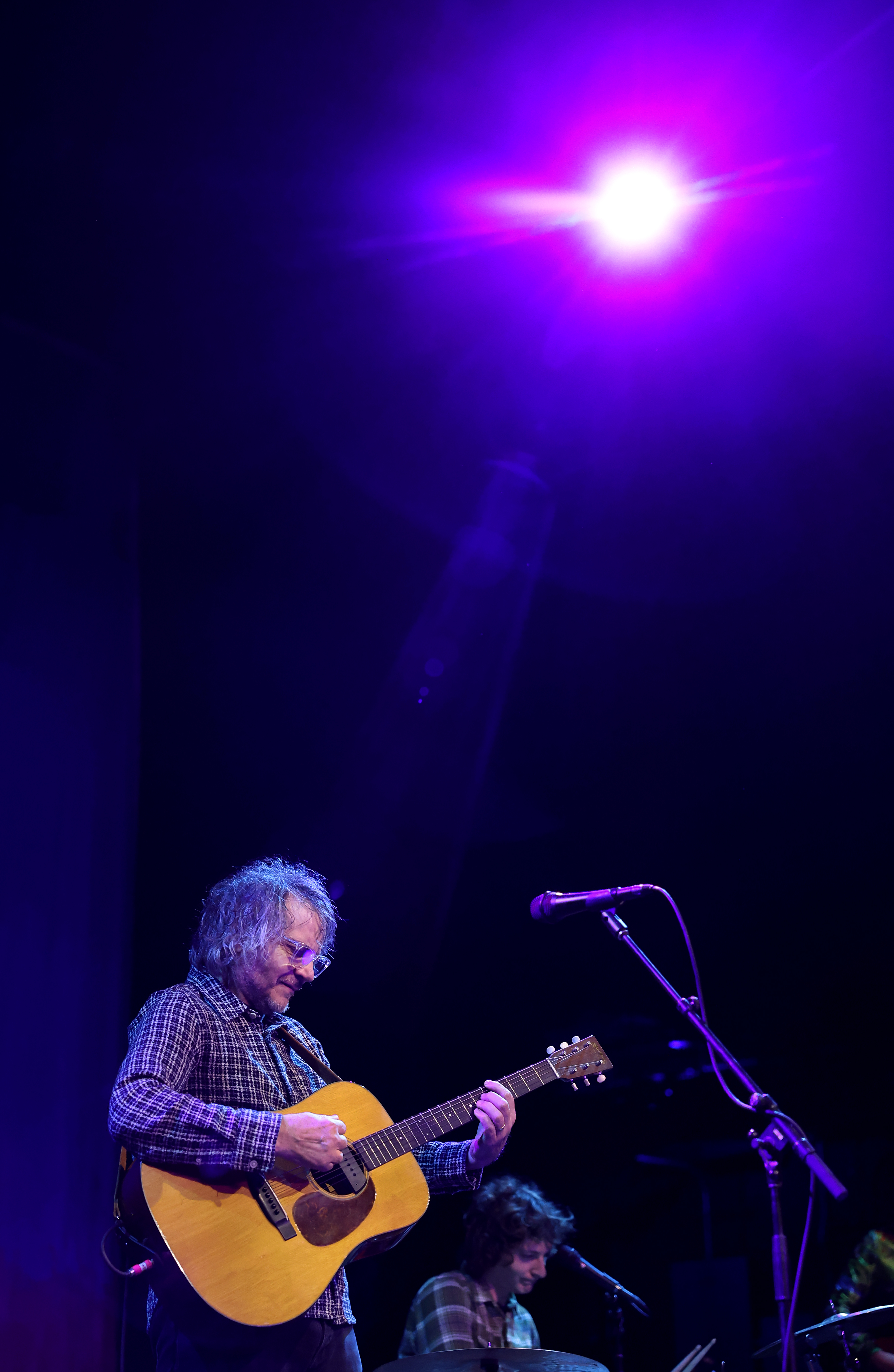Jeff Tweedy did the Salt Shed audience a favor Saturday. Speaking in his typical half-joking manner, the Chicago-based singer-songwriter told the near-capacity crowd he would warn them before he started a quiet song.
True to his word, he did. There were plenty of hushed and meditative moments, including those that steered clear of percussion. Yet there was also an abundance of sweeping tones and contrasting volumes in the delightful concert, which saw the vocalist-guitarist in a relaxed mood and seemingly in better physical shape than in the recent past.
Backed by a versatile quintet comprised of family and friends — all five of whom Tweedy has known since they were children — the Wilco leader leaned on seemingly basic songs to suggest the need to pause and reflect on joys, mysteries, losses and memories. Though the collective seldom heated tempos to a boil or shifted into gear into letting loose on a weekend, it advanced material with a warm interplay that hit upon unspoken themes that emerged during the two-hour show.
Namely, Tweedy’s appetite for life, in spite of the darkness and fear hovering over our current existence. And his enduring passion for rock ‘n’ roll. The latter subject received shout-outs in the clever “Lou Reed Was My Babysitter,” the nearest the Belleville, Illinois, native came to unleashing a shout-from-your-lungs anthem. The revolutionary music of Tweedy’s youth (and beyond) found further sonic favor amid shuffling fare and a few abstract excursions. With Tweedy looking completely rejuvenated from two hip replacement surgeries, this was a homecoming to savor.
Few local artists retain a busier creative schedule or contribute as much to the community. Since the start of 2021, Tweedy has logged more than 250 international dates with Wilco and issued two studio efforts with his main band. The 58-year-old singer also penned his second and third books. Next month at the Vic, he will reunite with Golden Smog for his first area gig with the indie collective in ages.
This past spring, the singer continued his tradition of playing benefit concerts at which he plays audience requests. In September, he headlined a charitable event for Jewish Community Centers of Chicago outside of Wrigley Field. Weeks later, he hosted a pop-up show at Adler Planetarium.
Those appearances preceded the release of “Twilight Override,” Tweedy’s first solo project in five years. To simply call it a record shortchanges its breadth. In an era where three-minute songs struggle to capture the attention of listeners who try to get their fixes by constantly swiping and scrolling, Tweedy made a triple album with a run time of almost two hours. It ranks with Wilco’s “Cruel Country” (2022) as the most consistent and engaging Tweedy-involved work in a decade.
Selections from the 3LP set accounted for a lion’s share of Saturday’s set. The lone nod to Wilco (a horn-accompanied version of “Far, Far Away”) bowed as one of two “special” songs the ensemble picked exclusively for Chicago. The other, a frisky cover of Rufus’ ‘70s funk hit “Tell Me Something Good” sung by Sima Cunningham, underlined the goal of spotlighting tunes with a local connection.
The same could be said for the rest of the group. Violinist/keyboardist Macie Stewart, who opened, and records for esteemed Bridgeport-based label International Anthem, joined her Finom mate Cunningham, Liam Kazar (guitar) and Tweedy’s sons Spencer (drums) and Sammy (synthesizer) in a unit that claimed deep Chicago ties and operated with a naturalism suited to the homegrown tenor of the arrangements. They combined on gorgeously airy harmonies and, on a handful of occasions, swapped instruments.
Some of Tweedy’s happiness stemmed from his fortune of teaming with a company of people he watched grow up and follow a path he chose. His familiar tousled nest of hair now tinted with shades of silver and gray, the bespectacled leader gave each collaborator a generous introduction by plugging their accomplishments. Kinship and camaraderie carried over to the music.
Where most tours are polished or diluted to a certain degree — at best, the routine is unintended and, at worst, corporate slickness gets baked into the presentation — nothing about Tweedy’s performance felt forced or programmed. Going beyond keeping surprise a reality by altering the setlist on a nightly basis, Tweedy’s approach brought things down to an organic level that evoked the comfortable setting of a backwoods campfire or back-porch jam session. Despite the absence of pressure and pretense, there was no doubting the seriousness with which the band took its roles.
Anchored by Spencer Tweedy’s jazz-influenced brush and stick work, and complemented by Stewart’s sweet-and-sour violin lines, the band expanded the scope, character and textural palette on a majority of Tweedy’s new songs. It enhanced the tranquil beauty of vocally dominant tracks such as the feather-light “Stray Cats in Spain” and minimalist “Twilight Override.” It let Tweedy indulge his inner mad scientist on wiry, crooked-note solos to the unsettling “No One’s Moving On” and waltzing “This Is How It Ends.”
Above all, it allowed songs to breathe and bloom. Elegant melodies and clear-voiced lyrics stood on equal footing amid soundscapes that drew from country, folk, chamber, psychedelic, roots and ambient disciplines. Acoustic and electric elements meshed, the songs’ open architecture inviting tasteful accents. A Korg keyboard line doubled as a punctuation mark here. A creaky string passage signaled a mid-point U-turn there.
After “KC Rain (No Wonder)” finished abruptly, Tweedy acknowledged that a fair share of tunes featured unexpected and vague endings. The group handled the ambiguity with aplomb, whether via cascading voices suddenly dropping or indefinite rhythms halting on a downbeat. Or, more commonly, a swift turn of phrase.
Tweedy explored all-consuming issues like mortality (“Ain’t It a Shame”), sadness (“Caught Up in the Past”), devotion (“Half-Asleep”) and hope (“One Tiny Flower”) with poetic insightfulness and economic concision. The knotty dissonance of “Diamond Light, Pt. 1” — the only song other than the neutral-stuck “Flowering” that seemed out of place — and looming uncertainty of “Out in the Dark” indicated he didn’t always locate answers or uncover those he sought.
Still, Tweedy’s easygoing humor, especially prevalent on the rustic jangle of “Betrayed” and borderline shambolic “Forever Never Ends,” disarmed the narrative setbacks in the same way his introspective musings softly raged against a society robbed of empathy, love and spontaneity. His smartest and strongest advice to guard against such circumstances unfolded amid the 18 distinct stanzas, cozy strumming and faint wordless harmonies of “Feel Free.”
An instant classic, the instructional epic came across onstage as a protest song wrapped in the form of an innocent tone poem. A tribute to the power of the tangible, emotional, aspirational, impromptu and communal, and a life manual people of all generations would be wise to embrace in this increasingly virtual, artificial and polarized world.
Bob Gendron is a freelance critic.
Setlist at Salt Shed Nov. 1:
“Betrayed”
“One Tiny Flower”
“Caught Up in the Past”
“Parking Lot”
“Forever Never Ends”
“This Is How It Ends”
“World Away”
“Low Key”
“KC Rain (No Wonder)”
“Mirror”
“Gwendolyn”
“Stray Cats in Spain”
“Out in the Dark”
“Ain’t It a Shame”
“Flowering”
“New Orleans”
“Diamond Light, Pt. 1”
“No One’s Moving On”
“Feel Free”
“Lou Reed Was My Babysitter”
Encore
“Twilight Override”
“Family Ghost”
“Half-Asleep”
“Tell Me Something Good” (Rufus cover)
“Far, Far Away” (Wilco cover)
“Enough”



